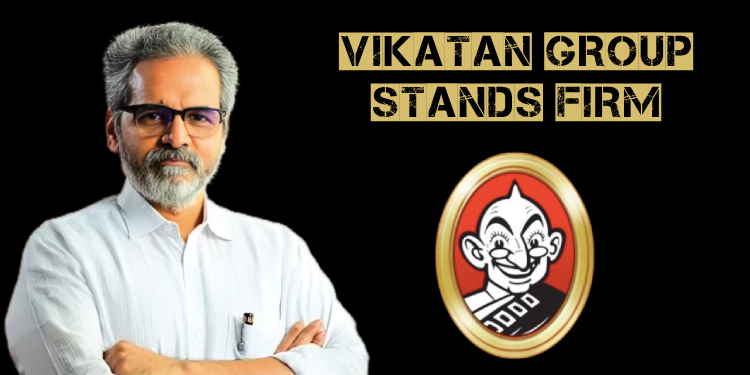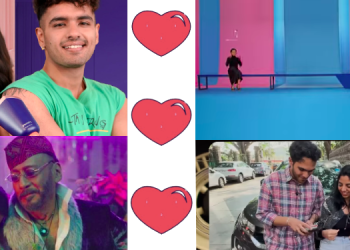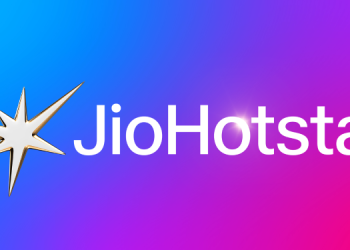Chennai: The renowned Tamil media house, Vikatan Group, has found itself at the center of a major controversy after its website, www.vikatan.com, was reportedly blocked by the central government on February 15, 2025, without prior notice or official explanation. The move has sparked widespread condemnation from political leaders, journalists, activists, and the general public, who have termed it an attack on press freedom.
The Controversy: Cartoon Sparks Political Backlash
The issue stems from a cartoon published in Vikatan Plus, the digital magazine of Vikatan Group, which criticized Prime Minister Narendra Modi’s silence over the recent handcuffing of Indian deportees from the U.S. The illustration reportedly compared the Indian government’s response to the incident with the high-handed approach of the U.S. authorities. While many BJP supporters condemned the cartoon, Tamil Nadu BJP President K. Annamalai lodged a formal complaint with the central government, expressing strong opposition to the publication.
Following the backlash, several users began reporting that they were unable to access the Vikatan website. In a statement posted on social media, the Vikatan Group noted that while it was uncertain if the government had officially blocked the site, access had been restricted.
Unexpected Website Shutdown and Government Response
Vikatan Group’s Managing Director Srinivasan B took to LinkedIn to provide a detailed timeline of events, stating that the site was abruptly blocked on February 15, 2025, without any prior notice or warning.
“A day later, the Ministry of Information and Broadcasting sent an email seeking clarification regarding the cartoon published in Vikatan Plus. However, the email did not provide any official confirmation regarding the sudden shutdown of our website,” wrote Srinivasan B.
Emphasizing the organization’s longstanding commitment to freedom of speech and journalistic integrity, he vowed to challenge the website blockade legally.
Massive Support for Vikatan: Political Leaders and Media Stand in Solidarity
The media fraternity, politicians, and social activists have strongly opposed the move, viewing it as a suppression of free speech. Leaders from across party lines, particularly from Tamil Nadu, have raised concerns about the implications of such actions on democracy.
Tamil Nadu Chief Minister M.K. Stalin was among the first to react, condemning the blockade as an example of the “fascist nature” of the BJP government.
“It is not fitting for a democracy to block the media over their opinions,” Stalin said in a social media post, urging the government to immediately lift the ban on the website.
A Wave of Support from Political and Media Circles
Several prominent leaders have also expressed their solidarity with Vikatan, including:
- Vaiko (MDMK General Secretary)
- Thol. Thirumavalavan (VCK President & MP)
- Tamil Nadu Congress President Selvaperunthagai
- MPs Sasikant Senthil, Manickam Tagore, Kanimozhi, Su. Venkatesan, and Jothimani
- Film personalities Kamal Haasan, Prakash Raj, and director Pa. Ranjith
- Dravidar Kazhagam President K. Veeramani
- Environmental activist Sundararajan (Poovulagin Nanbargal)
- Senior journalists including N. Ram, Dhanya Rajendran (The News Minute), and Anusha Ravi (The South First)
Various state and district press associations across Tamil Nadu and Puducherry have also condemned the move, calling it an attack on independent journalism.
Legal Challenge on the Horizon
Vikatan Group has vowed to fight the ban through legal channels, reaffirming its commitment to journalistic integrity and press freedom.
“Heartfelt thanks… A fight continues!” concluded Srinivasan B in his post, expressing gratitude to everyone who has stood by Vikatan during this challenging time.
What Lies Ahead?
With pressure mounting on the central government, media watchdogs and legal experts are closely watching the next steps in this evolving situation. Whether the central government clarifies its stance or the issue escalates into a legal battle remains to be seen.
For now, the Vikatan controversy has reignited the debate on press freedom in India, with many questioning whether the government’s actions are setting a dangerous precedent for media censorship.

















